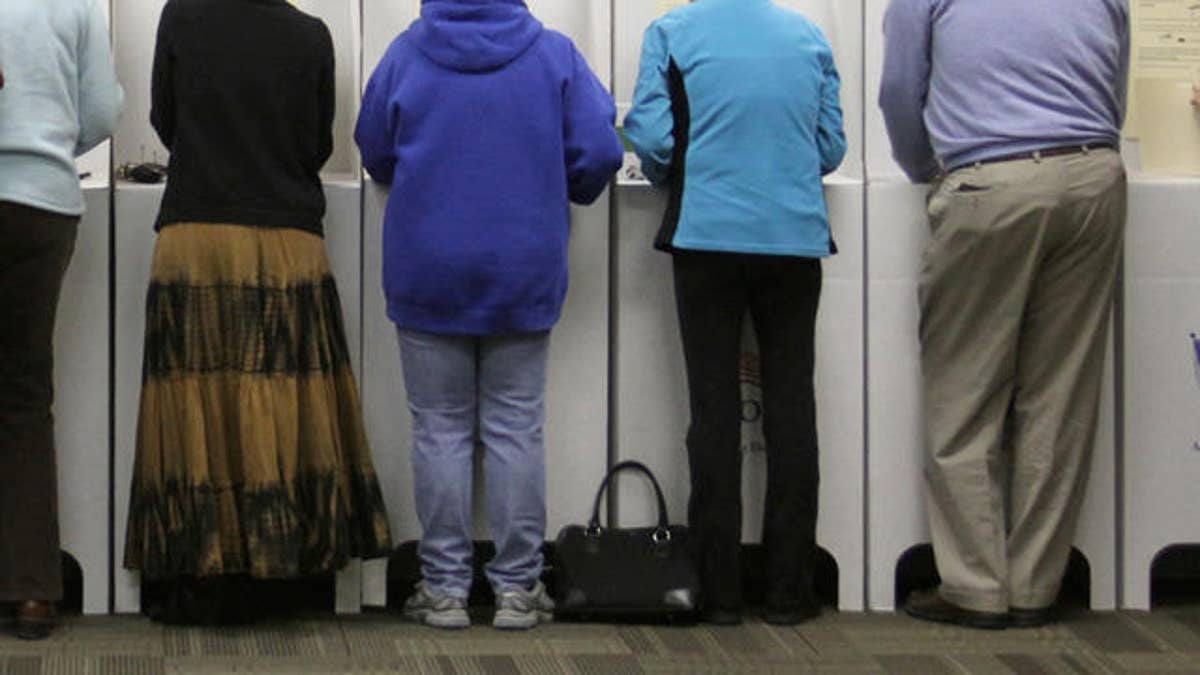
Voters cast their ballots in the general election on Tuesday, Nov. 2, 2010 in Star, Idaho. (AP Photo/Charlie Litchfield) (AP)
As widely reported, last week a federal court rejected a Texas law that would require voters to present photo identification to election officials before being allowed to vote. This decision comes on the heels of another federal court decision that found the Republican-controlled Texas legislature had intentionally discriminated against Hispanics in drawing new legislative districts.
The Texas voter ID law was signed into law last year. However, the law has never gone into effect because Texas is a covered jurisdiction under Section 5 of the Voting Rights Act of 1965, and must receive either administrative preclearance from the Department of Justice or judicial preclearance from a federal court that a proposed change in its election laws (such as a requirement to present a photo ID) will not have the effect of diminishing minority voters' rights, and was not enacted with a specific intent to discriminate against such voters.
The Justice Department earlier objected to the new Texas law concluding it would have a disparate negative impact on minority voters. The court last week reached a similar conclusion that the legislation would impose unlawful burdens on poor minority voters.
Because voter ID laws in Indiana or Georgia were found constitutional, Texas had argued its law should be upheld. The State's argument, while predictable, misses the mark. This court was not asked to decide the constitutionality of Section 5 or of the Texas voter ID law; it was asked to decide whether the Texas law met the statutory requirements of Section 5. The court concluded Texas had failed to meet its burden.
Texas elected to impose requirements that the court described as "the most stringent in the country." The State could have chosen to allow other forms of identification, or even provided relief to alleviate the financial burden and inconvenience to Texas' poorest citizens (many or whom are black or Hispanic) of obtaining a photo ID. Now the State finds its options limited primarily to an appeal to the U.S. Supreme Court of the denial under Section 5, or a direct challenge to the constitutionality of Section 5.
I wrote in a previous post that I support state efforts to ensure the sanctity of every vote, including requiring photo identification. I continue to support such measures - provided they comport with law. State action that discriminates unlawfully on the basis of race is unacceptable and wrong.
Some argue that because there is relatively little voter fraud, on balance voter ID laws do more harm than good because they discourage eligible voters from voting. The irony of this decision is that many of Texas' poorest and disadvantaged citizens will not even attempt to register to vote in November.
Turnout in Texas, like in most states, is embarrassingly low. Unfortunately, a small voter turnout magnifies the harm that results from even a small number of fraudulent votes. For all these reasons, it is my hope that Texas will successfully implement a voter ID law that protects - to the greatest degree possible - the sanctity of everyone's vote, while securing the voting rights of its most disadvantaged citizens. With the issues at stake this November, Texans can ill afford another misstep.
Alberto R. Gonzales is the former United States Attorney General and the former Counsel to President George W. Bush. He is currently the Doyle Rogers Distinguished Chair of Law at Belmont University, Of Counsel at the Nashville law firm of Waller Lansden, and a regular columnist for Fox News Latino.
Follow us on twitter.com/foxnewslatino
Like us at facebook.com/foxnewslatino




